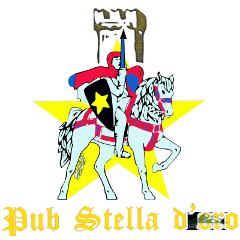4 August – The day of reckoning
By the beginning of August 2013 a fire had been burning on Monte Jovet above Patocco for almost three weeks (Read about the first three weeks in Part one). The fire was now burning on Gran Cuel above Patocco, threatening the village in a way that no one had really believed would happen.
2 August
On August 2nd the fire was still a few hundred meters above the village on Gran Cuel but it had already descended along the flanks of Rio Patocco and was advancing towards the cemetery. It now had the potential to threaten Patocco from both below and above. In the preceding days fire breaks had been cut in the areas behind the houses and fire-fighting equipment prepared to protect the village. Meanwhile, the bombardment of the fire from the air continued throughout the daylight hours with Helicopters and Canadair planes.
Messaggero 25 Luglio 2013 – A Patocco si sfalcia per frenare il fuoco
Smoke was becoming a problem for the residents of the village, descending into the valley at night a thick smog reduced visibility at sunrise. This smog only cleared later in the morning as the air warmed, and was rapidly becoming a threat to health and well-being.
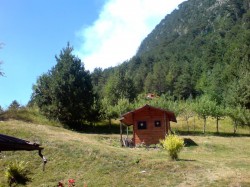
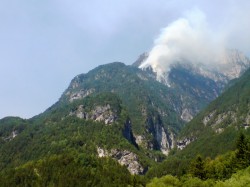
The fire was still advancing, despite the best efforts of the various firefighting teams – Guardia Forestale, Protezione Civile and now the Vigili del Fuoco, who had also now joined the battle from the ground. [Aside: One thing that seemed strange to me, as a foreigner, was this late intervention of the fire service. In most countries, fire fighters are responsible for extinguishing fires. In Italy however, it seems the lines of responsibility are somewhat blurred with the Guardia Forestale apparently being responsible for fighting forest fires whilst the Vigili del Fuoco only dealt with fires in or threatening houses. It is for others to judge whether this division of responsibilities and fire fighting resources had any effect on the outcome].
3 August
On 3rd August the helicopters and aircraft were again flying non-stop during daylight hours once the smoke cleared. It was apparent that more airborne resources were needed to stop the fire reaching the village. But, it was alleged that government spending cuts and other fires in the region, meant the available resources were limited and overstretched. A lack of water in the village itself was also an obstacle as only a limited supply was available from the spring fed water main, which had already run dry once. This meant, helicopters had to fly down into the Val Raccolana to pick up water, extending the time between drops by several minutes.
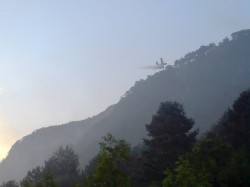
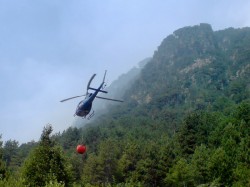
A ground battle, fighting the fire with water hoses and beaters, was now being waged around the clock in Rio Patocco to prevent the fire reaching the village from below. There was also a danger of the fire spreading to the other side of the valley and Monte Jama. The afternoon breeze emboldened the fire, but it remained away from the houses. However, we went to sleep that night with an uneasy feeling that the unthinkable might now actually happen.
4 August
Messaggero 4 Agosto 2013 – Il Fuoco non molla e per i 30 villeggianti di Patocco e allarme
A year ago today, dawn on 4th August bought more smog, which cleared quickly with a light breeze. But, the breeze also fanned the flames and increased in late morning. The fire now spread rapidly both from the west in Rio Patocco and above from Gran Cuel on what turned out to be one of the hottest days of the year. By mid-afternoon it became clear it would soon reach the village and the Vigili del Fuoco ordered the evacuation of the upper houses. They planned to start a controlled burn of vegetation close to the village below the fire to deny it fuel.
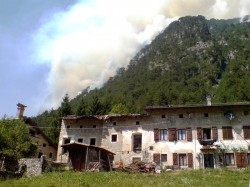
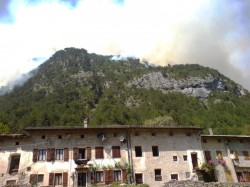
Whilst some left Patocco, many of the villagers gathered on the hill around the church to watch what unfolded. The fire was burning fiercely along a front from behind the cemetery in Rio Patocco, across the cliffs immediately behind the village, over to Rio Chiout Cali. It continued to advance despite constant bombardment with water from the air. There were sporadic flashes of flames as pine trees literally exploded with their resin igniting in a fireball. There were occasional small explosions too, which some blamed on abandoned munitions from the last two wars , a good assumption but of untested validity.
Around 16:30 p.m flames could be seen very close to the lower houses as the Vigili del Fuoco conducted their controlled burn. All we could do was watch as the flames crept towards the houses. One impediment for the firemen was the road around the houses which at one junction is very narrow and prevented them maneuvering their vehicles at a critical time.
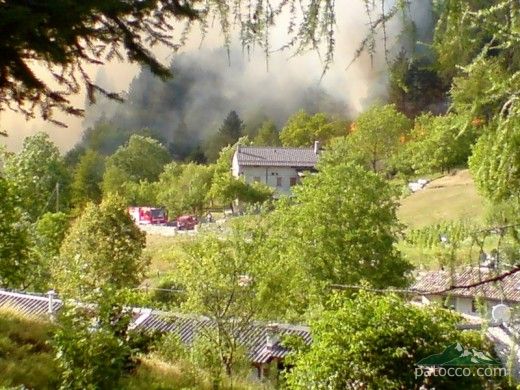
In the direction of the ravine called Rio Chiout Cali, regular flare-ups could be seen until approx. 18:20 when there was an enormous fireball with flames leaping tens of meters into the air. Despite this being up to 1Km away, a loud roaring sound could be heard, along with the heat. The blaze had now crossed Rio Chiout Cali and become a wild inferno burning up the eastern side of the ravine, known locally as Sbrici. Presumably, the steep narrow sides of the ravine provided a chimney effect and with largely pine vegetation, the speed of combustion was truly amazing. In ten or fifteen minutes the flames had reached right to the top of Sbrici leaving nothing but scorched earth. No longer contained, the fire would proceed to wreak havoc along the Val Raccolana in the coming days.
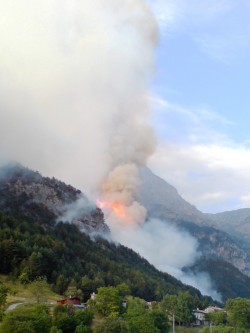
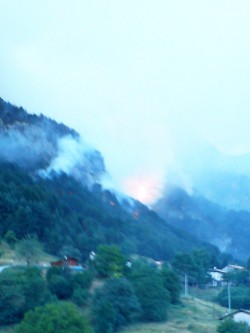
The fire reached the firebreaks cut along the road behind “il ciuc” in the early hours of 5 August and was met by a contingent of firefighters who fought the fire with hoses and beaters. They managed to contain it without the flames reaching the houses, or spreading below the village. For Patocco, a disaster had been averted for now, but the situation remained serious in the Val Raccolana with the fire burning on a wide front and large amounts of forest and wildlife destroyed.
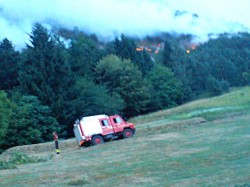
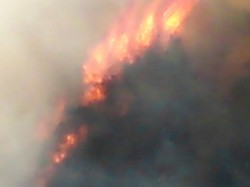
From the church I watched the progress of the fire towards the houses until around 1 a.m. when I left to get some sleep at a friends house. Returning around 7 a.m. the next morning, on the road up to Patocco I encountered Massimo Pugneti, the director of fire fighting operations. I inquired if I still had a house and he replied, “yes, you still have a house, but it’s been a very long night”.
To be continued…

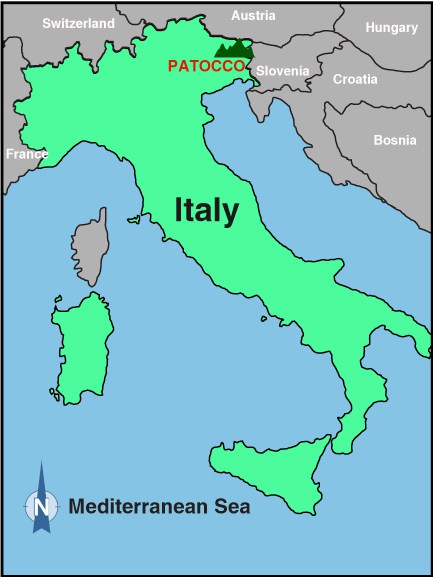 Patocco is located in the Val Raccolana, part of the "Comune di Chiusaforte" in Udine Province, Friuli Venezia Giulia. Italy.
Patocco is located in the Val Raccolana, part of the "Comune di Chiusaforte" in Udine Province, Friuli Venezia Giulia. Italy.